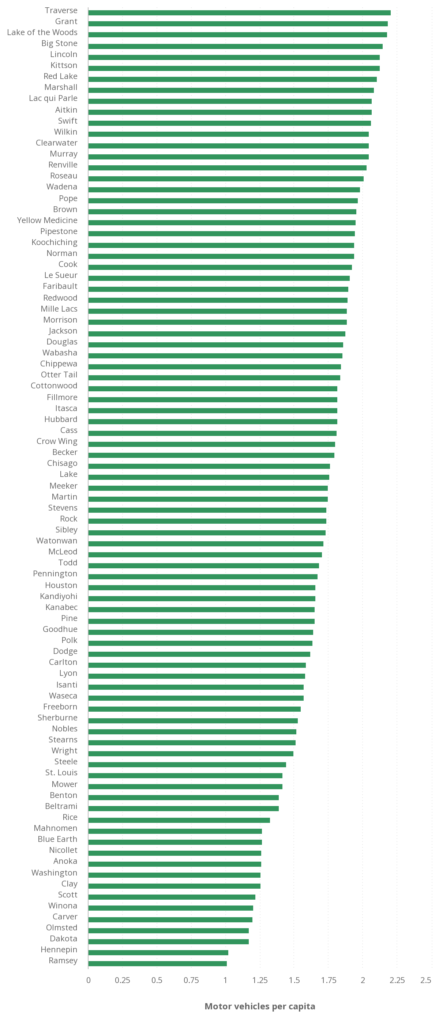Sam Rockwell is Incorrect on Cars, Climate
Sam Rockwell, who is the President of the Minneapolis Planning Commission, recently wrote an oped in the Star Tribune entitled “To Save the Planet, We Have To Get Over Cars,” where he espoused his vision for a future where we must give up our cars and drastically reduce the number of vehicle miles traveled in order to save the planet.
Fortunately, I firmly believe Mr. Rockwell’s vision of the future is one which few others will find desirable.
Mr. Rockwell’s article was actually a response to another article, which advocated for more Minnesotans to switch to electric cars. I think this is also a bad idea, because electric cars are more expensive and less useful than conventional cars at this time, but Mr. Rockwell’s column is perhaps the perfect embodiment of the urban planner who is utterly detached from the desires and needs of the general public.
Minnesota is a state where people rely heavily upon cars to get from Point A to Point B. In fact, most households in the state have more than one car, and this trend is especially pronounced in Greater Minnesota, where driving a car isn’t a luxury, it is a necessary part of life. The graph below shows car ownership per household in each Minnesota county.

Even households in Minnesota’s more-urban areas have cars. According to statistics in Governing Minneapolis has the lowest rate of car ownership in the state, with “only” 82.9 percent of households owning a car in 2016. In St. Paul, 86.5 percent of households owned a car, and 91.1 percent of Rochester households owned a car in 2018. Many of these households owned more than one vehicle.
Owning a car was once viewed as a ticket to the American Middle Class, and increasing rates of car ownership were seen as a good thing because it resulted in more opportunities for work and play.
Empirical research shows this is still true today. A recent study from USC found that car commuters in low-income neighborhoods in San Diego have about 30 times greater job accessibility than those who take public transit. Clearly, owning a car results in better options for workers of all income brackets.
Despite the evidence, urban planners in Minneapolis want to reduce passenger miles by 38 percent. Could you please pick your kids up from school 40 percent fewer times? Could you please take 40 percent fewer trips to the doctor’s office or the grocery store?
This is exactly what City Planners in Minneapolis are advocating just to cut carbon dioxide emissions, even though 90 percent of trips in Minneapolis are taken by car, according to city data.
How much global warming would actually be averted if Minnesota as a whole, not just Minneapolis, reduced its CO2 emissions from the transportation sector by 80 percent, anyway? Not very much, unsurprisingly.
According to data from the Minnesota Pollution Control Agency, transportation accounted for approximately 42 million metric tons of CO2 in 2016, so 80 percent of this total would be 33.6 million metric tons.
If we use the same assumptions used by the Obama administration in its formulation of the Clean Power Plan (CPP), we can estimate the impact on global warming such a reduction would have. The CPP would have averted 730 million metric tons, and was expected to avert 0.019 degrees C of future warming by 2100, according to the climate models used by the Obama Administration’s EPA.
Minnesota’s transportation emissions constitute 0.046 of the reductions sought by the Clean Power Plan, meaning reducing such emissions by 80% would avert approximately 0.0008 degrees C by 2100, an amount far too small to be measured
For reasons I don’t understand, many of the urban liberals in Minnesota seem desperate to turn our state into the next California, New York, or Seattle, whether it be through mandating $15 minimum wages, ramping up taxes, or artificially funneling people into the public transit sector when most folks would prefer to drive to work.
Forcing Minnesotans to make due with less is a feature, not a bug, of plans to radically reduce carbon dioxide emissions. In the end it means fewer options, and fewer opportunities for Minnesota families.
It remains to be seen whether Mr. Rockwell will be successful in his desire to reduce emissions by attempting to create cities where driving is difficult and walking is prioritized. It may work, or it may incentivize more people to leave the city in favor of more-car-friendly suburbs. If the latter occurs, emissions could increase if vehicle miles increase.
Either way, Mr. Rockwell can pry my car keys from my cold, dead fingers.